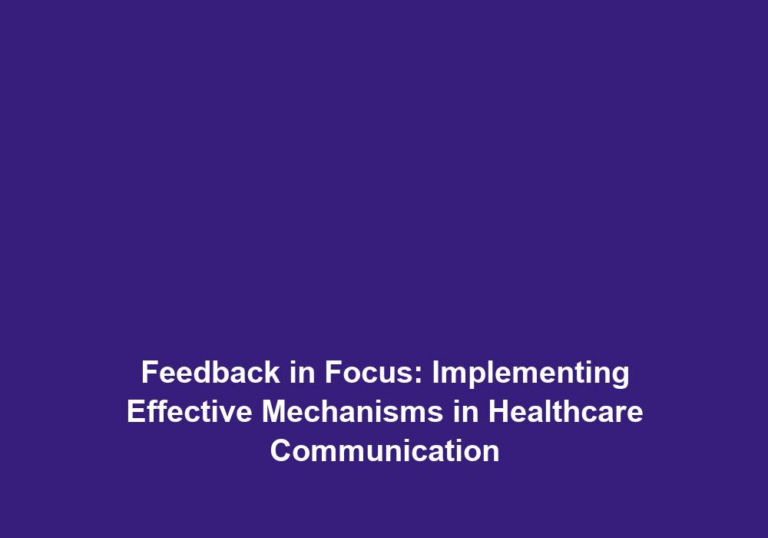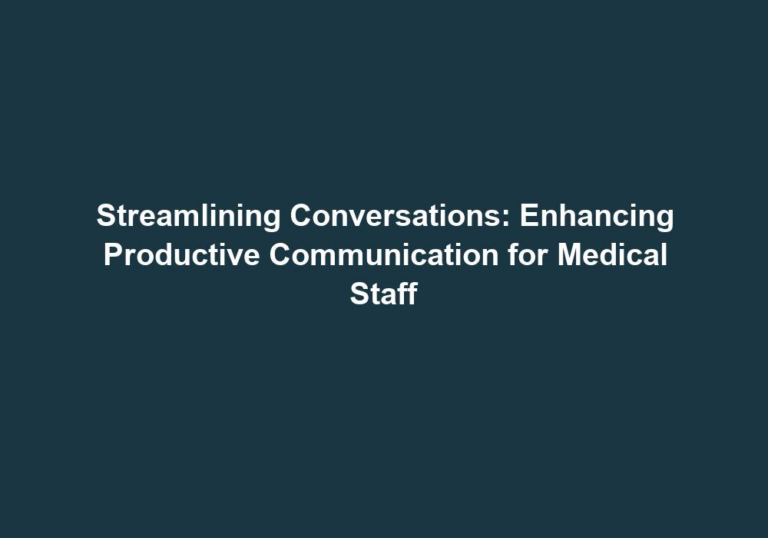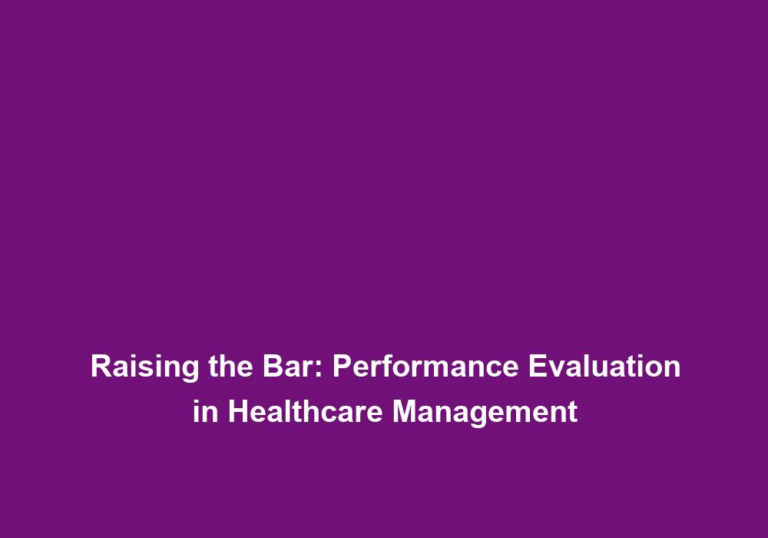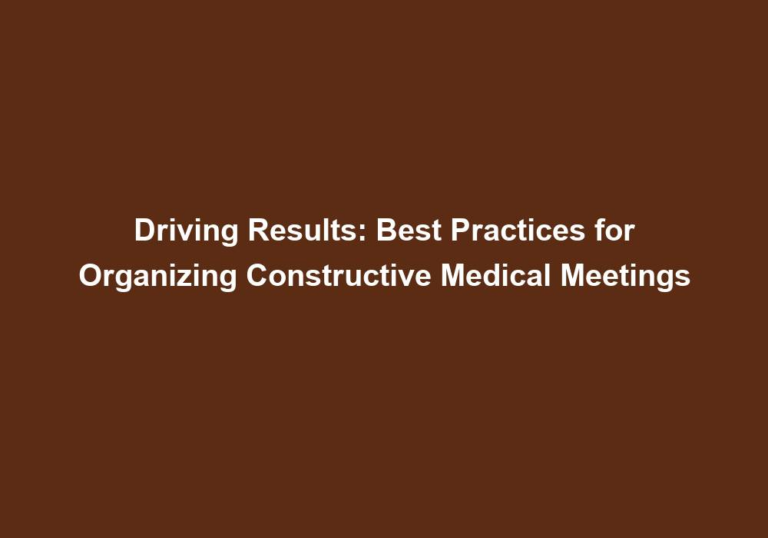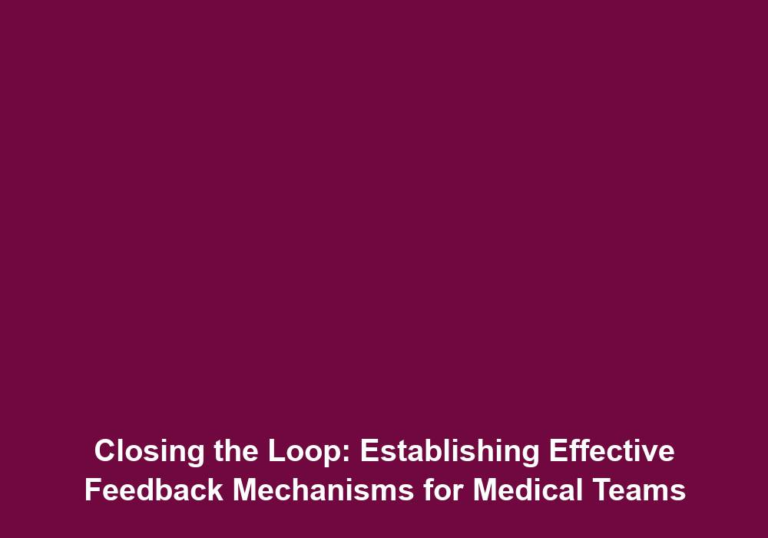Feedback in Focus: Implementing Effective Mechanisms in Healthcare Communication
Effective communication is integral to the success of any healthcare system. It plays a crucial role in fostering trust, ensuring patient satisfaction, and improving overall quality of care. One key aspect of communication that often gets overlooked is feedback. In this article, we will explore the importance of feedback in healthcare, discuss the challenges faced in implementing effective feedback mechanisms, and provide strategies to overcome these challenges.
The Importance of Feedback in Healthcare
Feedback in healthcare serves multiple purposes. It allows healthcare providers to assess their performance, identify areas for improvement, and make necessary adjustments to enhance patient outcomes. Additionally, feedback enables patients to express their concerns, provide suggestions, and actively participate in their own healthcare journey. When feedback is actively sought and acted upon, it can lead to increased patient satisfaction, improved patient safety, and better overall healthcare experiences.
To fully understand the importance of feedback in healthcare, it is essential to consider its impact on different aspects of the healthcare system:
-
Assessing Performance: Feedback provides valuable insights into the performance of healthcare providers. By receiving feedback from patients, colleagues, and supervisors, healthcare professionals can gain a comprehensive understanding of their strengths and weaknesses. This information is crucial for continuous professional development and improving the quality of care provided.
-
Identifying Areas for Improvement: Feedback serves as a catalyst for improvement in healthcare. It highlights areas that require attention and enables healthcare organizations to implement targeted interventions. Whether it is improving communication skills, enhancing clinical practices, or streamlining administrative processes, feedback plays a vital role in driving positive change.
-
Enhancing Patient Outcomes: By actively seeking and acting upon feedback, healthcare providers can tailor their services to meet patient needs. Feedback allows patients to voice their concerns, preferences, and expectations, enabling healthcare professionals to deliver personalized care. This patient-centered approach can lead to improved health outcomes and better overall patient experiences.
-
Building Trust and Patient Satisfaction: Feedback is a powerful tool for building trust between healthcare providers and patients. When patients feel that their concerns are heard and addressed, it enhances their satisfaction with the healthcare experience. This, in turn, fosters trust and strengthens the patient-provider relationship, which is essential for effective healthcare delivery.
Challenges in Implementing Effective Feedback Mechanisms
Despite the evident benefits of feedback, healthcare organizations often face challenges in implementing effective mechanisms. These challenges can hinder the establishment of a robust feedback culture and limit the potential for improvement. Some of the common challenges include:
1. Lack of a Feedback Culture
Many healthcare systems do not have a culture that encourages regular feedback. This can be attributed to hierarchical structures, fear of reprisal, or a lack of awareness regarding the importance of feedback. As a result, healthcare professionals may be reluctant to seek feedback or may not know how to provide constructive feedback.
To address this challenge, healthcare organizations should actively promote a feedback culture. This can be achieved by providing training on effective feedback techniques, creating open communication channels, and recognizing and rewarding individuals who actively seek and act upon feedback. By fostering a supportive environment, healthcare organizations can encourage a culture of continuous improvement.
2. Limited Feedback Channels
In some healthcare settings, the only available feedback channel is through formal complaint processes. This restricts the avenues through which patients and healthcare providers can provide feedback. As a result, valuable feedback and suggestions may be overlooked or not effectively captured.
To overcome this challenge, healthcare organizations should diversify feedback channels. This can include implementing online platforms for feedback submission, placing suggestion boxes in healthcare facilities, conducting dedicated feedback sessions, and utilizing patient surveys. By providing multiple channels, healthcare organizations increase the likelihood of capturing a wide range of feedback, ensuring that valuable insights are not missed.
3. Inadequate Feedback Analysis
Even when feedback is collected, the lack of proper analysis and follow-up actions can render it ineffective. Without a systematic approach to analyze and act upon feedback, healthcare organizations may miss out on opportunities for improvement.
To ensure effective feedback analysis, healthcare organizations should establish structured processes. This can involve assigning dedicated staff to review and categorize feedback, identifying trends and recurring issues, and developing action plans to address them. Regular reporting and monitoring of feedback-related activities can further enhance accountability and transparency, ensuring that feedback is not only collected but also acted upon.
4. Language and Cultural Barriers
In multicultural healthcare settings, language and cultural barriers can impede effective feedback exchange. Patients from diverse backgrounds may struggle to articulate their concerns, and healthcare providers may find it challenging to understand and address them. This can hinder the flow of meaningful feedback.
To address language and cultural barriers, healthcare organizations should implement strategies to facilitate effective communication. This can include providing interpreters or translators for non-English-speaking patients, offering culturally sensitive communication training to healthcare providers, and utilizing technology solutions such as multilingual feedback platforms. By improving communication accessibility, healthcare organizations can ensure that all patients can provide feedback comfortably, regardless of their cultural or linguistic background.
5. Time Constraints
Healthcare professionals often have demanding schedules and limited time for feedback-related activities. This can hinder their ability to actively seek feedback or allocate sufficient time to address the feedback received. As a result, feedback may go unaddressed or not be given the attention it deserves.
To overcome time constraints, healthcare professionals should be encouraged to allocate dedicated time for feedback-related activities. This can involve scheduling regular feedback sessions, dedicating specific time slots for reviewing and addressing feedback, and incorporating feedback-related tasks into performance evaluations and workload management systems. By prioritizing feedback, healthcare professionals can ensure that it receives the attention it deserves, leading to meaningful improvements in care delivery.
Strategies for Overcoming Feedback Challenges
To overcome these challenges and implement effective feedback mechanisms in healthcare, the following strategies can be adopted:
1. Foster a Feedback Culture
Healthcare organizations should actively promote a culture that values feedback and encourages its regular exchange. This can be achieved by providing training on effective feedback techniques, creating open communication channels, and recognizing and rewarding individuals who actively seek and act upon feedback. By fostering a supportive environment, healthcare organizations can encourage a culture of continuous improvement.
2. Diversify Feedback Channels
Healthcare organizations should provide multiple channels through which patients and healthcare providers can provide feedback. This can include online platforms, suggestion boxes, dedicated feedback sessions, and patient surveys. By diversifying feedback channels, healthcare organizations increase the likelihood of capturing a wide range of feedback, ensuring that valuable insights are not missed.
3. Implement Robust Feedback Analysis Processes
To ensure that feedback is effectively analyzed and acted upon, healthcare organizations should establish structured processes. This can involve assigning dedicated staff to review and categorize feedback, identifying trends and recurring issues, and developing action plans to address them. Regular reporting and monitoring of feedback-related activities can further enhance accountability and transparency, ensuring that feedback is not only collected but also acted upon.
4. Address Language and Cultural Barriers
Healthcare organizations should implement strategies to overcome language and cultural barriers in feedback exchange. This can include providing interpreters or translators for non-English-speaking patients, offering culturally sensitive communication training to healthcare providers, and utilizing technology solutions such as multilingual feedback platforms. By improving communication accessibility, healthcare organizations can ensure that all patients can provide feedback comfortably, regardless of their cultural or linguistic background.
5. Allocate Dedicated Time for Feedback
To ensure that feedback receives the attention it deserves, healthcare professionals should be encouraged to allocate dedicated time for feedback-related activities. This can involve scheduling regular feedback sessions, dedicating specific time slots for reviewing and addressing feedback, and incorporating feedback-related tasks into performance evaluations and workload management systems. By prioritizing feedback, healthcare professionals can ensure that it receives the attention it deserves, leading to meaningful improvements in care delivery.
Conclusion
Feedback is a crucial component of effective healthcare communication. By recognizing the importance of feedback, addressing the challenges associated with its implementation, and adopting strategies to overcome these challenges, healthcare organizations can create a culture of open communication and continuous improvement. Through effective feedback mechanisms, healthcare professionals can enhance patient experiences, improve clinical outcomes, and ultimately deliver high-quality care.


